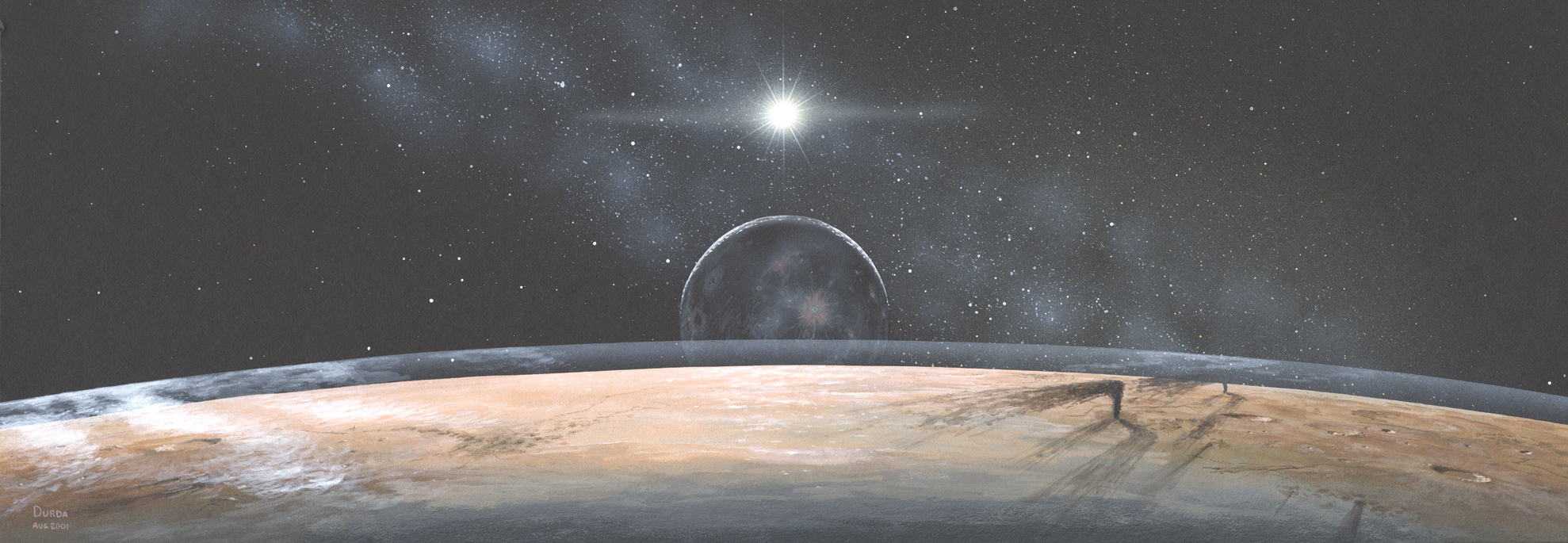What Pluto Really Is
That is not a difficult question, thanks to the miracles of modern science. Pluto is a large ball of rock and ice.

Dan Durda’s concept of the Pluto-Charon system on the Astronomy Picture of the Day archive.

Update Sep. 2nd. Also from the APOD Archive, Pluto in true color at the highest resolution currently available.
Pluto is the same today as it was last year. The only difference is that the Astronomical Union decided to put it in a different category. That means nothing, absolutely nothing, outside our own heads.
Inside our heads, however, which is where we spend much of our time, it makes a huge difference. People hate learning new names for things just as much as they hate having the “shift” key suddenly appear in a strange place on a new keyboard. It means having to expend neurons on relearning something that functioned perfectly well before.
The problem of names is not unique to Pluto. It’s something biologists have dealt with for hundreds of years. Recently, for instance, Apatosaurus was found to be the correct name for the much better known brontosaurus. That created a good bit of annoyance. Well-known genera of orchids, like Odontoglossum, turn out to be invalid and all have to be renamed. Not only do all the textbooks have to be rewritten, but thousands of horticulturalists have to redo labels, change marketing materials, and somehow stop their prize plants from losing name recognition. These problems are expensive as well as annoying. People talk–and I’m not sure they’re always joking– about taking out contracts on the scientists wreaking the cognitive havoc.
Botanists have actually been dealing with this problem longer than any other branch of science, and if the astronomers had one of those nice broad liberal arts backgrounds we hear so much about, the kind that makes them aware of disciplines outside their own, then they would have realized that the solution to their problem was staring them in the face.
It’s called conservation of names. When a technically incorrect name is in wide usage, and when it would be too disruptive to people’s minds to change it, then the name can be conserved. It’s just a name, remember. We humans came up with it in the first place. Like Humpty Dumpty, we can do anything we want with it. So the Astronomical Union could have said, “Pluto isn’t a planet,” or “Ceres and Vesta really are planets. However,” they could have continued, “we’ll conserve the popular designations, and only we scientists will have to do the mental gymnastics necessary to remember what the right name really is.” Which is as it should be. If they didn’t want to do mental gymnastics, they shouldn’t have become scientists.
Instead the dingbats decided to mess with everyone else’s mind, and now they’re reaping their just desserts. Hopefully, that’ll teach them a thing or two, including the concept of conservation.



(I had problems with Haloscan, so these comments were replaced manually. That messed the links up.)
quixote on September 20th, 2006 at 18:57
SeanH’s comment:
This attitude is convenient in the short term, but in the long term it has a damaging effect on the language. If we never bother to update English to reflect new knowledge and wisdom, it will become even more confused and full of potholes than it already is. The short-term disruption is worth it to avoid watering down the meanings of our words.
Aug. 31, 2006
quixote on September 20th, 2006 at 18:59
Linda’s comment:
The whole affair reminds me of the resistance to the metric system in the United States. People just don’t like to be behind the times; I think they dislike losing arguments to their kids. It’s pitiful. Then again, I really never learned metric measurements, so I will slink back into my corner now…
Sept. 1, 2006
quixote on September 20th, 2006 at 18:59
Well, yes, Sean and Linda, you’ve both brought up good points. Ideally, language keeps up with reality. But when there’s much emotion involved, as there seems to be with Pluto–(and as there often is with orchids. You think Pluto has caused a storm, you ain’t seen nothin yet. Really.)–then everyone can wind up further ahead by taking the cognitive changes more slowly. Eventually the language catches up, but the scientists don’t generate resentment that does neither them nor the thing involved any good. “Eventually” sometimes means a few generations. I didn’t say the language necessarily catches up fast…. (My personal preference in the Pluto debate was the definition that would have made Ceres, Vesta, and the big one in the Kuiper Belt all planets. And eventually who knows how many more would have joined the group. So what if we have to rewrite the textbooks every few years? Keeps things interesting.)
Sept 2, 2006
quixote on September 20th, 2006 at 19:01